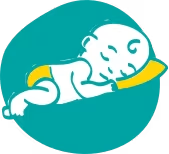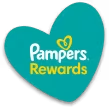
When Do Babies Start Talking?
Few baby milestones are as thrilling as your child’s first words. The words sound just plain adorable, for one thing, but the fact that your little one can start to verbally express their wants and needs is a huge accomplishment for both of you. In this article, we’ll tackle the big question, “When do babies start talking?” as well as other topics related to speech and language. So, read on to find out when you might hear your baby say their first words, what some typical language development milestones are for babies and toddlers, and how you can help encourage your baby to start talking.
When Do Babies Say Their First Words?
First words and other speech and language milestones occur at widely varying times for different children, and your little one will progress at their own pace. As a general guideline, a baby might say their first few words close to their first birthday. Then, in your child's second year, their vocabulary may expand slowly at first but eventually pick up momentum. By the end of this second year, many (but not all) toddlers may be able to say dozens of words and put together two words to make a sentence.
When Do Babies Start Babbling?
Before babies start saying words, they may start cooing and then progress to babbling.
Babbling generally occurs around 4 to 7 months. This adorable stage of language development marks an exciting milestone in your little one's journey toward communication. During this time, your baby will begin to produce a variety of consonant and vowel sounds, such as “ba-ba” or “ya-ya,” as they explore the range of sounds their tiny mouths can make. This is often called “baby talk,” and it's exciting to realize that your little one is actually trying to imitate the rhythms and characteristics of their language.
When your baby starts babbling, you can encourage their language development by responding to them. If you hear them saying something like “ba-ba,” repeat it back to them and say some real words that sound similar, like “baby,” “bottle,” or “ball,” or sing a nursery rhyme like “Baa Baa Black Sheep.”
At What Age Do Babies Start Talking?
When do babies talk? On average, babies generally start talking and saying their first words around 12 months of age; however, as mentioned above, this will vary from child to child.
You may also be wondering when babies start talking in sentences. As with saying their first words, the timeline for forming sentences can vary greatly for each child. In general, toddlers can put two or three words together to form a short sentence by the time they’re 2 years old.
How Do Babies Learn to Say Their First Words?
Even before your little one begins to talk (talking is what experts refer to as expressive language), babies understand more than you think (understanding is known as receptive language). They’re also communicating effectively in a number of ways: They cry to let you know they’re hungry, coo when they’re happy, point at a toy they want, or turn their face at a food they don’t like.
This type of gestural and vocal communication lays the groundwork for the development of speech and language.
Babies learn to talk by listening to you and others talking. Babies prefer listening to the human voice over other sounds, and your baby will especially love the sound of your voice because it’s the most comforting for them.
Generally, babies prefer high-pitched voices. This is why you might find yourself talking to your baby in a higher pitch than you would when speaking to adults. This higher pitch, exaggerated pronunciation, and playful facial expressions you probably use all capture your baby’s attention and also contribute to helping develop their speech and language skills.
What Are a Baby’s Talking Milestones?
Below you will find some of the important language development milestones grouped by broad age ranges.
Keep in mind that these age ranges aren’t set in stone. You may see your baby or toddler reach certain speech and language milestones earlier or later than what’s described here. If you’re ever uncertain about whether your little one is on track or have any questions about your child's development, reach out to your baby’s healthcare provider.
Language Development Milestones: 1- to 3-Month-Old Babies
When your baby is at least 1 month old, they may be able to recognize your voice, whether or not you’re in the same room. Smiling and gurgling at you when seeing your face indicates that they realize these facial expressions and sounds are a way to engage with you.
Around 2 months of age, your baby may start cooing and producing sounds like “ah-ah-ah” or “ooh-ooh-ooh.” Feel free to imitate them by repeating these sounds while also adding some simple words, as this engages your little one in a two-way “conversation.”
Language Development Milestones: 4- to 7-Month-Old Babies
At this point, your baby may be babbling often in what is sometimes called “baby talk”. Between about 4 and 7 months of age, they may make sounds like “muh-muh” or “bah-bah,” which are signs that your baby may talk soon.
They’ll also be attuned to your voice as you go about your daily routine and will be learning from your voice when you’re going to feed, change, or take them for a stroller ride.
It may take a year or more for you to be able to interpret your baby’s babbling—but keep in mind that they can understand much of what you say well before uttering their first words.
Language Development Milestones: 8- to 12-Month-Old Babies
Your baby’s coos, gurgles, and screeches may start to be replaced by syllables like ba, da, ga, and ma. They may say something that sounds like “mama” or “dada” as they practice these syllables; soon, they’ll realize these words have meaning when seeing your obvious excitement in response.
By this point, your baby will likely understand a lot more than you think, even though they might not be able to communicate in more than a few simple words.
It’s natural for parents to wonder about the number of words their little one can say, and a common question is, “How many words should a 12-month-old say?” It's important to remember that each child develops differently. It could be around this age when your child begins to use some recognizable words. Some babies have a vocabulary of about 2 or 3 words by the time they turn 1 year old. Keep in mind, though, that what's more likely for most children at this age is talking in a sort of gibberish that's starting to sound like comprehensible language. Some parents may wish to introduce baby sign language at this stage of development.
Language Development Milestones: 13- to 24-Month-Olds
At this point, your toddler will have a very good understanding of language. They’ll know, for example, what "nap" means, which is why you might have to spell out this word (or any other word you don't want them to understand) when you're talking to someone else nearby.
During the course of this year, your child will become more responsive to directions and requests from you and may even put together some short two- or three-word sentences.
You no longer need to speak in a high-pitched baby voice. Go ahead and use your normal voice, and continue to speak to your toddler using simple words and short phrases or sentences.
As your child’s speech develops, they may change portions of words by substituting different letters or sounds. You might be the only one who understands their way of saying certain words. For example, they may say “wa-wa” for water. When this happens, you can reinforce your child’s made-up word wa-wa with the correctly pronounced word water to help build their language skills.
How to Help Encourage Your Baby to Talk
Ready to encourage your baby’s speech and language development? Here are some tips you can follow to help your little one start talking:
Can Being Bilingual Have an Effect on Babies?
If there’s more than one language spoken in your home, this is more of a benefit than a hindrance to your child. If a child is exposed to two languages from a very young age, they may be able to learn both at the same time, especially if using both consistently.
It’s natural for one language to be stronger than the other during a child’s language development or for words to get mixed up. But over time, a child may be able to distinguish more clearly between the two languages and communicate well in both.
What Happens if Your Baby Doesn’t Start to Talk?
Some children develop language skills and a vocabulary consistently, whereas others take a while to become talkative. A toddler of speaking age (between 1 and 2 years old) who is quiet may know just as many words as one who is talkative but chooses not to use them. They may just be shyer and more reserved.
It might also help to know that, typically, girls develop their speech and language skills a little earlier than boys.
Still, if you feel your baby is behind in language development, it’s best not to wait or ignore it. Instead, raise any concerns you may have with your little one’s healthcare provider.
Delays in speech and language development are very treatable in babies and toddlers. The earlier a professional sees your child, the sooner your healthcare provider can help. Your provider may recommend your little one see a hearing specialist or a speech-language pathologist.
FAQS AT A GLANCE
Babies typically start saying words like “mama” by around 12 months of age. Remember, though, that every child develops differently and may reach milestones at different stages.
The Bottom Line
Although you may be wondering, “When do babies start talking?” and are eagerly awaiting your baby’s first words, it’s best to be patient; your little one will start talking when they’re ready. In the meantime, keep talking, reading, and singing to them as a way to teach and encourage speech development. Eventually, they’ll surprise you with their first words, and soon they’ll be talking and asking questions as a way of exploring the world in a whole new way. During this time, you’ll probably need to change a lot of diapers. To make the task a bit more rewarding, download the Pampers Rewards app to earn rewards for your diaper purchases.
- American Academy of Pediatrics. Caring for Your Baby and Young Child: Birth to Age 5, 7th ed. (New York: Bantam Books, 2019).
- Healthy Children. “How to Raise Concerns about a Child’s Speech and Language Development: Do’s and Don’ts.”
- Kids Health. “Learning, Play, and Your 1- to 2-Year-Old.”
- Mayo Clinic. “Language development: Speech milestones for babies.”
Read more about Toddler
Join a World of Support
through Pregnancy and Parenthood.
TRACK WITH TOOLS
LEARN WITH EXPERTS
GET REWARDED







